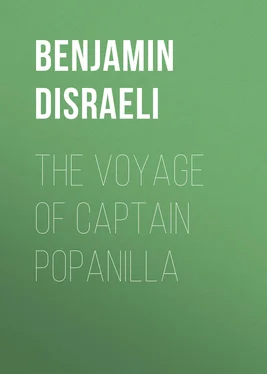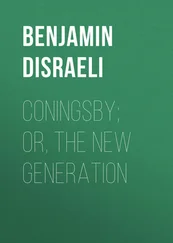Benjamin Disraeli - The Voyage of Captain Popanilla
Здесь есть возможность читать онлайн «Benjamin Disraeli - The Voyage of Captain Popanilla» — ознакомительный отрывок электронной книги совершенно бесплатно, а после прочтения отрывка купить полную версию. В некоторых случаях можно слушать аудио, скачать через торрент в формате fb2 и присутствует краткое содержание. Жанр: foreign_sf, literature_19, foreign_antique, foreign_prose, на английском языке. Описание произведения, (предисловие) а так же отзывы посетителей доступны на портале библиотеки ЛибКат.
- Название:The Voyage of Captain Popanilla
- Автор:
- Жанр:
- Год:неизвестен
- ISBN:нет данных
- Рейтинг книги:4 / 5. Голосов: 1
-
Избранное:Добавить в избранное
- Отзывы:
-
Ваша оценка:
- 80
- 1
- 2
- 3
- 4
- 5
The Voyage of Captain Popanilla: краткое содержание, описание и аннотация
Предлагаем к чтению аннотацию, описание, краткое содержание или предисловие (зависит от того, что написал сам автор книги «The Voyage of Captain Popanilla»). Если вы не нашли необходимую информацию о книге — напишите в комментариях, мы постараемся отыскать её.
The Voyage of Captain Popanilla — читать онлайн ознакомительный отрывок
Ниже представлен текст книги, разбитый по страницам. Система сохранения места последней прочитанной страницы, позволяет с удобством читать онлайн бесплатно книгу «The Voyage of Captain Popanilla», без необходимости каждый раз заново искать на чём Вы остановились. Поставьте закладку, и сможете в любой момент перейти на страницу, на которой закончили чтение.
Интервал:
Закладка:
Popanilla then went on to show that the hitherto received definitions of man were all erroneous; that man is neither a walking animal, nor a talking animal, nor a cooking animal, nor a lounging animal, nor a debt-incurring, animal, nor a tax-paying animal, nor a printing animal, nor a puffing animal, but a developing animal. Development is the discovery of utility. By developing the water we get fish; by developing the earth we get corn, and cash, and cotton; by developing the air we get breath; by developing the fire we get heat. Thus, the use of the elements is demonstrated to the meanest capacity. But it was not merely a material development to which he alluded; a moral development was equally indispensable. He showed that it was impossible for a nation either to think too much or to do too much. The life of man was therefore to be passed in a moral and material development until he had consummated his perfection. It was the opinion of Popanilla that this great result was by no means so near at hand as some philosophers flattered themselves; and that it might possibly require another half-century before even the most civilised nation could be said to have completed the destiny of the human race. At the same time, he intimated that there were various extraordinary means by which this rather desirable result might be facilitated; and there was no saying what the building of a new University might do, of which, when built, he had no objection to be appointed Principal.
In answer to those who affect to admire that deficient system of existence which they style simplicity of manners, and who are perpetually committing the blunder of supposing that every advance towards perfection only withdraws man further from his primitive and proper condition, Popanilla triumphantly demonstrated that no such order as that which they associated with the phrase ‘state of nature’ ever existed. ‘Man,’ said he, ‘is called the masterpiece of nature; and man is also, as we all know, the most curious of machines; now, a machine is a work of art, consequently, the masterpiece of nature is the masterpiece of art. The object of all mechanism is the attainment of utility; the object of man, who is the most perfect machine, is utility in the highest degree. Can we believe, therefore, that this machine was ever intended for a state which never could have called forth its powers, a state in which no utility could ever have been attained, a state in which there are no wants; consequently, no demand; consequently, no supply; consequently, no competition; consequently, no invention; consequently, no profits; only one great pernicious monopoly of comfort and ease? Society without wants is like a world without winds. It is quite clear, therefore, that there is no such thing as Nature; Nature is Art, or Art is Nature; that which is most useful is most natural, because utility is the test of nature; therefore a steam-engine is in fact a much more natural production than a mountain. 2 2 The age seems as anti-mountainous as it is anti-monarchical. A late writer insinuates that if the English had spent their millions in levelling the Andes, instead of excavating the table-lands, society might have been benefited. These monstrosities are decidedly useless, and therefore can neither be sublime nor beautiful, as has been unanswerably demonstrated by another recent writer on political aesthetics—See also a personal attack on Mont Blanc, in the second number of the Foreign Quarterly Review, 1828.
‘You are convinced, therefore,’ he continued, ‘by these observations, that it is impossible for an individual or a nation to be too artificial in their manners, their ideas, their laws, or their general policy; because, in fact, the more artificial you become the nearer you approach that state of nature of which you are so perpetually talking.’ Here observing that some of his audience appeared to be a little sceptical, perhaps only surprised, he told them that what he said must be true, because it entirely consisted of first principles. 3 3 First principles are the ingredients of positive truth. They are immutable, as may be seen by comparing the first principles of the eighteenth century with the first principles of the nineteenth.
After having thus preliminarily descanted for about two hours, Popanilla informed his Majesty that he was unused to public speaking, and then proceeded to show that the grand characteristic of the social action 4 4 This simple and definite phrase we derive from the nation to whom we were indebted during the last century for some other phrases about as definite, but rather more dangerous.
of the Isle of Fantaisie was a total want of development. This he observed with equal sorrow and surprise; he respected the wisdom of their ancestors; at the same time, no one could deny that they were both barbarous and ignorant; he highly esteemed also the constitution, but regretted that it was not in the slightest degree adapted to the existing want of society: he was not for destroying any establishments, but, on the contrary, was for courteously affording them the opportunity of self-dissolution. He finished by re-urging, in strong terms, the immediate development of the island. In the first place, a great metropolis must be instantly built, because a great metropolis always produces a great demand; and, moreover, Popanilla had some legal doubts whether a country without a capital could in fact be considered a State. Apologising for having so long trespassed upon the attention of the assembly, he begged distinctly to state 5 5 Another phrase of Parliament, which, I need not observe, is always made use of in oratory when the orator can see his meaning about as distinctly as Sancho perceived the charms of Dulcinea.
that he had no wish to see his Majesty and his fellow-subjects adopt these new principles without examination and without experience. They might commence on a small scale; let them cut down their forests, and by turning them into ships and houses discover the utility of timber; let the whole island be dug up; let canals be cut, docks be built, and all the elephants be killed directly, that their teeth might yield an immediate article for exportation. A short time would afford a sufficient trial. In the meanwhile, they would not be pledged to further measures, and these might be considered only as an experiment. 6 6 A very famous and convenient phrase this—but in politics experiments mean revolutions. 1828.
Taking for granted that these principles would be acted on, and taking into consideration the site of the island in the map of the world, the nature and extent of its resources, its magnificent race of human beings, its varieties of the animal creation, its wonderfully fine timber, its undeveloped mineral treasures, the spaciousness of its harbours, and its various facilities for extended international communication, Popanilla had no hesitation in saying that a short time could not elapse ere, instead of passing their lives in a state of unprofitable ease and useless enjoyment, they might reasonably expect to be the terror and astonishment of the universe, and to be able to annoy every nation of any consequence.
Here, observing a smile upon his Majesty’s countenance, Popanilla told the King that he was only a chief magistrate, and he had no more right to laugh at him than a parish constable. He concluded by observing that although what he at present urged might appear strange, nevertheless, if the listeners had been acquainted with the characters and cases of Galileo and Turgot, they would then have seen, as a necessary consequence, that his system was perfectly correct, and he himself a man of extraordinary merit.
Here the chief magistrate, no longer daring to smile, burst into a fit of laughter; and turning to his courtiers said, ‘I have not an idea what this man is talking about, but I know that he makes my head ache: give me a cup of wine, and let us have a dance.’
Читать дальшеИнтервал:
Закладка:
Похожие книги на «The Voyage of Captain Popanilla»
Представляем Вашему вниманию похожие книги на «The Voyage of Captain Popanilla» списком для выбора. Мы отобрали схожую по названию и смыслу литературу в надежде предоставить читателям больше вариантов отыскать новые, интересные, ещё непрочитанные произведения.
Обсуждение, отзывы о книге «The Voyage of Captain Popanilla» и просто собственные мнения читателей. Оставьте ваши комментарии, напишите, что Вы думаете о произведении, его смысле или главных героях. Укажите что конкретно понравилось, а что нет, и почему Вы так считаете.












